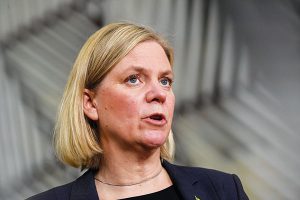Bloomberg
Sweden’s government wants to boost defense spending to meet the target that the Nato defense alliance has set for its members, as the largest Nordic nation seeks to strengthen its ability to defend itself after Russia’s attack on Ukraine.
The country, which currently spends about 1.3% of gross domestic product on its military, wants to reach the level of 2% of GDP, Prime Minister Magdalena Andersson said. The premier, who has sought to dampen speculation of any near-term bid for membership in the North Atlantic Treaty Organization, cited the need to strengthen defense capability due to invasion of Ukraine and a generally worsened security situation.
“The allocation of resources to defense should increase to 2% of GDP, and we should reach that level as soon as it is practically possible,†Andersson said. “This is a large and crucial step for our country.â€
The move, which would mean accelerating Sweden’s already ambitious plan for an 85% increase in defense spending between 2014 and 2025, mirrors developments elsewhere in Europe. German Chancellor Olaf Scholz last month announced plans for a massive boost in defense spending in a historic policy shift, while neighboring Denmark also seeks to reach Nato’s target by 2033.
Sweden’s Saab surged as much as 9%, leading a rise in European defense stocks, following the announcement. The company’s shares have now gained more than 50% since Russia’s large-scale attack on its neighbor.
Andersson’s government faces increasing pressure from opposition parties advocating membership in Nato as well as the public, with recent polls showing a plurality in favor of joining Nato.
Denmark, a founding member of Nato, seeks to gradually increase military spending from the same level as a share of GDP to reach the 2% goal in 2033. As part of the deal its government and opposition parties reached last Sunday, it will hold a referendum on joining the European Union’s defense pact.
Sweden has boosted cooperation with its eastern neighbor Finland, which has the European Union’s longest border with Russia and is facing a similar surge in public backing for Nato entry after Russia’s attack. Finland’s government has pledged a reassessment of security policies, while saying its not in a rush for the move.
Andersson said the surge in spending also means “more young people will have to be prepared to do military service and contribute to the military defense.â€
 The Gulf Time Newspaper One of the finest business newspapers in the UAE brought to you by our professional writers and editors.
The Gulf Time Newspaper One of the finest business newspapers in the UAE brought to you by our professional writers and editors.
